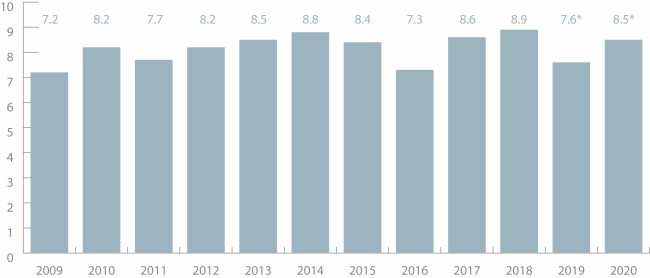Transport
Concrete is a locally produced material. Concrete's constituent materials are available throughout the UK and there is a regional network of manufacturers and distributors of concrete products.
Within the concrete supply chain, some elements of transport are relatively simple to measure; others are more complex potentially involving multiple modes of delivery with sub-contracted vehicles scheduling return loads to make efficient use of vehicles. This indicator of kg CO2/tonne is calculated from the conversion of concrete data and proportioned materials delivery (to a construction site) data using DEFRA carbon factors.
Performance indicator: CO2 emissions of the total delivery transport through the industry supply chain (kg CO2/tonne)

In 2020 the CO2 emissions related to the total delivery transport was 8.5kg CO2/tonne of production output.
In 2020 the average delivery distance for all concrete was 29 km. The average delivery distance for all raw materials for concrete was 42 km.
Ready-mixed concrete travels short distances, and is available from a network of batching plants. The average travel distance was 8 km.
Precast concrete and blocks are factory-produced and delivered directly from the factory, or through a network of builders merchants. The average travel distance was 104 km.
2020 Strategy Commitment
The concrete industry commitment to carbon reduction includes: Develop a Low Carbon Freight Initiative to support improvement in transport performance through the concrete supply chain to construction sites
Our current indicator is based on the CO2 emissions related to delivery transport. Efforts are underway to address the wider social and environmental impacts of transport through improved scheduling, vehicle quality and driver training. There are also examples of manufacturers investing in more efficient fleet and sector initiatives to encourage and enable a greater use of rail freight.
MPA and the Rail Freight Group have published a series of commitments and in 2019 published 'Rail Freight and Mineral Products working together to build Britain'. The mineral products industry is working closely with the rail freight industry including Network Rail to increase the use of rail. We are:
- Increasing the average payload per train: By increasing the length of trains and investing in new high payload wagons, we have achieved an 8% increase in loads per train in the last five years.
- Supporting development of the rail network and terminals: By investing in facilities, implementing longer trains and investigating problem areas, so that major routes can routinely accommodate trains of 450m length, with up to 2000t of payload.
- Promoting rail freight as the preferred solution for supplying major infrastructure schemes. By talking to developers, parliamentarians, local and central government officials and other stakeholders to ensure that a rail freight option is considered for all projects.
- Improving the safety and environmental performance of our rail operations: By improving training to ensure that all our staff are aware of the risks of working alongside the railway. By using trains and rolling stock more efficiently.
- Responsible users of the network, achieving continuous improvement: By working to improve performance and punctuality, increase efficiency and optimise and safeguard network capacity.